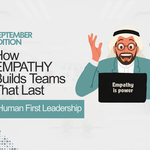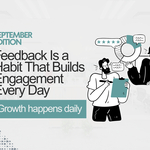
The Human Edge-How Empathy Builds Teams That Last
September 29, 2025




For years, flexibility has been handed out like a reward. A privilege you get after proving
yourself. A perk you thank your company for. But for people living through the daily grind
of work and life, flexibility is not a luxury. It is the difference between surviving and
performing.
I have seen employees breathe easier when they are trusted with their time. And when
people breathe easier, they create better. That is not a perk. That is performance.
The Old Lens
For too long, flexibility was treated like a privilege. Something you had to earn, almost
like a prize for loyalty. I have always felt uneasy about that. Because when you look
closely, it was never about performance, it was about control.
I have seen workplaces where people stayed late only to be noticed, not because the
work needed it. I have seen talented employees shrink under the pressure of being
present instead of being trusted. That way of working does not lift people up, it holds
them back.
Flexibility should never have been a perk. It should have been part of how we help
people succeed from the start.
The Data Speaks
Whenever I sit with teams and listen, one truth always comes through. People light up
when they are trusted with flexibility. Their energy shifts. Their commitment deepens.
They no longer carry the weight of proving themselves by staying visible, they focus on
giving their best.
I have seen mothers who could finally balance home and work without guilt. I have seen
young professionals bring out their creativity when they were free to choose how they
worked. These are not statistics, they are real lives. They are stories of people who
stayed, contributed, and grew because they felt trusted.
That is why I say flexibility is not generosity. It is the very fuel that powers engagement
and performance.
The Human Impact
What stays with me most are the stories. A working mother who said she finally felt like
herself again when she was trusted to set her own hours. A young graduate who found
their confidence because their manager cared more about results than about where
they were sitting. A senior leader who told me that flexibility gave him back the energy
to mentor his team instead of feeling drained by routine.
These stories remind me that flexibility is never about less effort. It is about creating the
right space for people to give their best. When people feel that space, they do not hold
back. They create, they commit, and they grow in ways that surprise even themselves.
Trust at the Core
At the heart of flexibility is trust. Without trust, flexibility turns into a checklist. With trust,
it becomes the strongest driver of performance.
I have seen this shift happen when leaders stop asking, “Are they working?” and start
asking, “What support do they need to do their best?” That one change builds
accountability in a way rules never can. People rise to the level of trust you give them.
This is where leadership shows itself. Not in control, but in creating conditions where
trust flows both ways. Flexibility is how you show people you believe in them, and that
belief is what fuels real performance.
Leadership Reframe
Leaders often ask me, “What can I do to drive performance?” My answer is simple. Stop
treating flexibility like an extra. Start building it into the way your organisation works
every single day.
If you still see flexibility as optional, you are holding your people back. The future
belongs to organisations that see it as a core strategy, not a side benefit. Because
flexibility does not weaken discipline, it strengthens ownership. It does not lower
standards, it lifts performance.
The question is no longer whether flexibility works. The question is whether leaders are
ready to lead with trust.
My Final Take On This
At Inspire, we help organisations design engagement frameworks where flexibility is not a perk but a foundation. If you are ready to explore what this could mean for your team, let us connect.